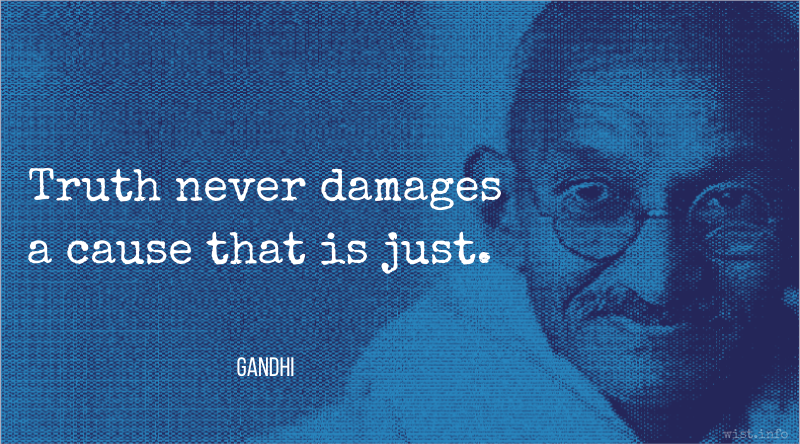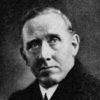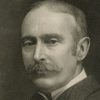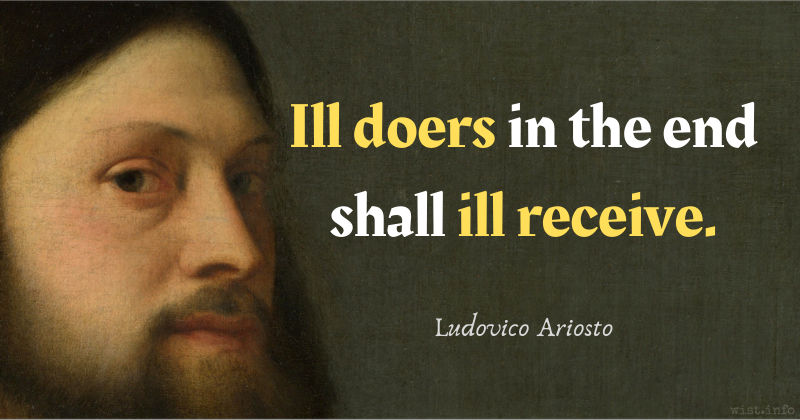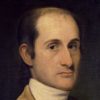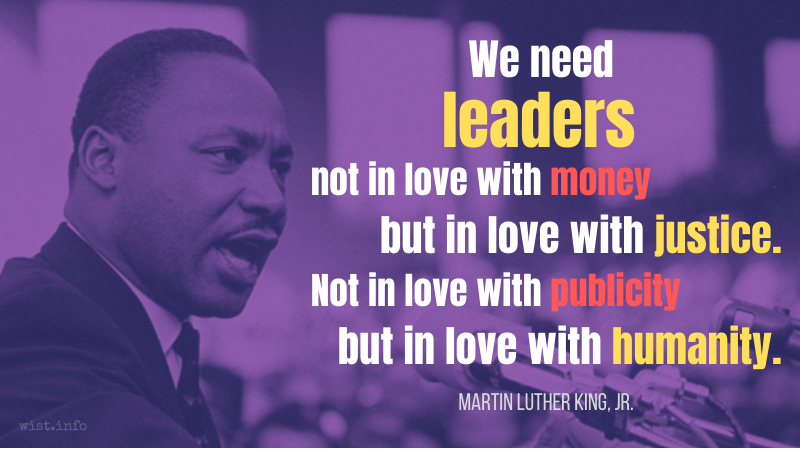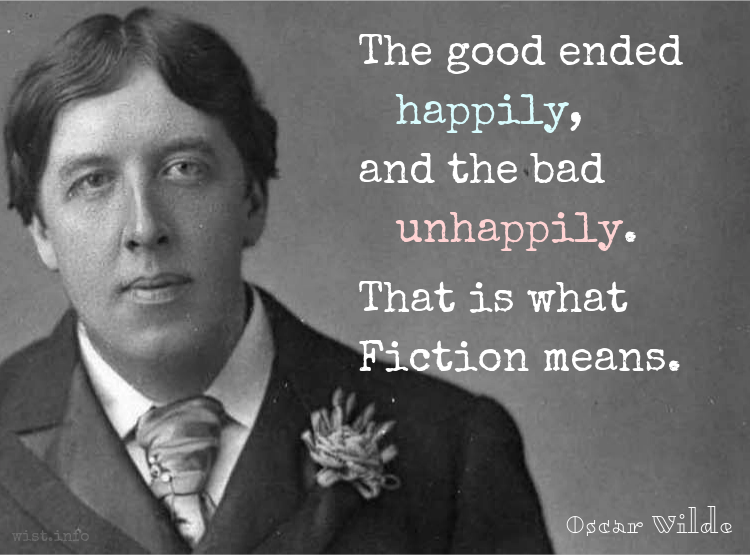For ourselves and for the present, we are safe; our immediate peril is past. But for how long are we safe; and how far have we removed our peril? If our nation could not itself exist half slave and half free, are we sure that it can exist in a world half slave and half free? Is the same conflict less irrepressible when world wide than it was eighty years ago when it was only nation wide? Right knows no boundaries, and justice no frontiers; the brotherhood of man is not a domestic institution.
Learned Hand (1872-1961) American jurist
“A Pledge of Allegiance,” speech, Central Park, New York City (1945-05-20)
(Source)
His second "I Am an American Day" address. Collected in The Spirit of Liberty (1953).
Quotations about:
justice
Note not all quotations have been tagged, so Search may find additional quotes on this topic.
HERMIONE: Since what I am to say must be but that
Which contradicts my accusation, and
The testimony on my part no other
But what comes from myself, it shall scarce boot me
To say “Not guilty.” Mine integrity,
Being counted falsehood, shall, as I express it,
Be so received. But thus: if powers divine
Behold our human actions, as they do,
I doubt not then but innocence shall make
False accusation blush and tyranny
Tremble at patience.William Shakespeare (1564-1616) English dramatist and poet
Winter’s Tale, Act 3, sc. 2, l. 23ff (3.2.23-33) (1611)
(Source)
EDGAR: The gods are just, and of our pleasant vices
Make instruments to plague us.William Shakespeare (1564-1616) English dramatist and poet
King Lear, Act 5, sc. 3, l. 204ff (5.3.204-205) (1606)
(Source)
They loved their wives, and were beloved by them. Their entire attention was directed to educating their children in the ways of virtue; the miseries of their fellow countrymen were constantly represented to them and held up as the sorriest of examples. Above all, they were taught that individual interest is always bound to the common interest, that to try to separate them was to invite ruin, that virtue is not something costly to achieve nor painful to exercise, and that justice for others is a blessing for ourselves.
They soon had the consolation of virtuous fathers, seeing their children develop in their image.[Ils aimoient leurs femmes, et ils en étoient tendrement chéris. Toute leur attention étoit d’élever leurs enfants à la vertu. Ils leur représentoient sans cesse les malheurs de leurs compatriotes, et leur mettoient devant les yeux cet exemple si touchant ; ils leur faisoient surtout sentir que l’intérêt des particuliers se trouve toujours dans l’intérêt commun ; que vouloir s’en séparer, c’est vouloir se perdre ; que la vertu n’est point une chose qui doive nous coûter ; qu’il ne faut point la regarder comme un exercice pénible ; et que la justice pour autrui est une charité pour nous.
Ils eurent bientôt la consolation des pères vertueux, qui est d’avoir des enfants qui leur ressemblent.]Charles-Lewis de Secondat, Baron de Montesquieu (1689-1755) French political philosopher
Persian Letters [Lettres Persanes], Letter 12, Usbek to Mirza (1721) [tr. Healy (1964)]
(Source)
In the story of the Troglodytes, a tribe who had been decimated by a plague after years of self-interested anarchy where every person did as they wished. The survivors developed a philosophy of mutual aid and community, and prospered.
(Source (French)). Alternate translations:
They lov'd their Wives, and were tenderly belov'd by them. They were wholly intent upon educating their Children to Virtue. They continually represented to them the Calamities of their Countrymen, and often set that moving Example before their Eyes. They above all things instill'd into them this Principle, that every private Man's Interest is inseparable from the Interest of the Community. To divide it, is Ruin. That Virtue is not a thing which should be troublesome to us, nor ought the Exercise of it to give us pain; and that Justice to another, is Charity to our selves.
They had soon the Consolation of virtuous Fathers; which is, to have Children like themselves.
[tr. Ozell (1736)]
They loved their wives, and were affectionately beloved by them. The training up their children to virtue engaged their utmost care. They continually represented to them the miseries of their countrymen, and placed their melancholy example before their eyes. They especially inculcated upon their minds, that the interests of individuals was always to be found in that of the community, and that to attempt to seek it separately was to destroy it; that virtue is by no means a thing that ought to be burdensome to us, nor the practice of it considered as painful; that doing justice to others is acting charitably to ourselves. They soon enjoyed the consolation of virtuous parents, which consists in having children like themselves.
[tr. Floyd (1762)]
They loved their wives, and were beloved most tenderly. Their utmost care was given to the virtuous training of their children. They kept before their young minds the misfortunes of their countrymen, and held them up as a most melancholy example. Above all, they led them to see that the interest of the individual was bound up in that of the community; that to isolate oneself was to court ruin; that the cost of virtue should never be counted, nor the practice of it regarded as troublesome; and that in acting justly by others, we bestow blessings on ourselves.
They soon enjoyed the reward of virtuous parents, which consists in having children like themselves.
[tr. Davidson (1891)]
They loved their wives, and were in turn tenderly beloved by them. Their whole ambition was to rear their children virtuously. They constantly placed before their eyes the misfortunes of their fellow-countrymen, and proved to them by this thrilling example that the interest of the individual is one with the interest of the community; that to attempt to separate them is to court ruin; that virtue is a thing the practice of which ought to be found easy; that we should never regard its cultivation as a painful exercise, and that justice to others is a blessing to ourselves. They had soon the consolation of virtuous fathers, which is to see their children grow up in their likeness.
[tr. Betts (1897)]
They loved their wives, who cherished them tenderly in return; they devoted their whole attention to raising their children in the path of virtue; they told them repeatedly of the misfortunes of their compatriots, and showed them those piteous examples; above all, they made them feel that the interest of the individual is always identical with the common interest, and that to attempt to separate oneself from it is fatal; that we should not find virtue arduous, or regard it as a painful exercise, and that justice to another is a charity to oneself.
Soon they knew the consolation of virtuous fathers, which is to have children like themselves.
[tr. Mauldon (2008)]
They loved their wives, who in turn cherished them. Their great aim was to raise their children in the path of virtue. They constantly told them stories about their compatriots, putting that unhappy example before their eyes. Above all, they stressed that one;s self0--interest is always contained within the common interest, and that to separate those two was to take a step toward ruin; they taught also that virtue need cost us nothing, that we must not regard virtue as a painful burden; finally, they taught that to do justice for one is to do good for all.
In time they enjoyed the consolation of virtuous fathers, which is to have children who resemble them.
[tr. MacKenzie (2014)]
The prosperous fortunes, and the haughty wealth
Of an unrighteous man, we never ought
To deem establish’d on a solid base,
Or that the children of th’ unjust can prosper:
For Time, who from no Father springs, applies
His levell’d line, and shews man’s foul misdeeds.
[οὐδέποτ᾽ εὐτυχίαν κακοῦ ἀνδρὸς ὑπέρφρονά τ᾽ ὄλβον
βέβαιον εἰκάσαι χρεών,
οὐδ᾽ ἀδίκων γενεάν” ὁ γὰρ οὐδενὸς ἐχφὺς
χρόνος δικαίους ἐπάγων κανόνας
δείκνυσιν ἀνθρώπων καχότητας ἐμοί.]Euripides (485?-406? BC) Greek tragic dramatist
Bellerophon [Βελλεροφῶν], frag. 303 (c. 430 BC) [tr. Wodhull (1809)]
(Source)
Nauck (TGF) frag. 305, Barnes frag. 33, Musgrave frag. 6.
(Source (Greek)). Alternate translations:
Think not that the prosperity and riches of the wicked can endure, nor yet the generation of the bad; for Time, sprung from eternity, having a just rule in his hand, shows the wickedness of men.
[Source (1878)]
One ought never to imagine the success of a bad man, and his proud wealth, as secure, nor the lineage of unjust men; for time, which was born from nothing, adduces standards which are just and shows the wickedness of men in spite of all.
[tr. Collard, Hargreaves, Cropp (1995)]
It must not be believed
that the wicked thrive securely
though puffed-up-proud in their prosperity
nor the long line of injustices go on and on
uninterrupted -- Self-generating Time
(slowly -- slowly) lays
the yardstick of justice --
into the open (at least) brings
all iniquities of men.
For all that. For all that.
[tr. Stevens (2012)]
You could say to the universe this is not fair. And the universe would say: Oh, isn’t it? Sorry.
The surest safeguard against treason is a polity so just and equitable that no one will wish to betray it. Such an inspiration of men’s affection and men’s confidence is a more dependable guarantee of national security than the most searching catechism or the most diligent secret police. As we depart from this principle we confess our weakness, to our enemies as well as to ourselves. As we are faithful to it we realize our strength and show it to the world.
Whitney Griswold (1906–1963) American historian, educator [Alfred Whitney Griswold]
“Freedom, Security, and the University Tradition,” speech, Columbia University Bicentennial (1954-06-02)
(Source)
Reprinted in Griswold, In the University Tradition (1957).
Two conditions are essential to the realization of justice according to law. The law must have an authority supreme over the will of the individual, and such an authority can arise only from a background of social acquiescence, which gives it the voice of indefinitely greater numbers than those of its expositors. Thus, the law surpasses the deliverances of even the most exalted of its prophets; the momentum of its composite will alone makes it effective to coerce the individual and reconciles him to his subserviency. The pious traditionalism of the law has its roots in a sound conviction of this necessity; it must be content to lag behind the best inspiration of its time until it feels behind it the weight of such general acceptance as will give sanction to its pretension to unquestioned dictation.
Learned Hand (1872-1961) American jurist
“The Speech of Justice,” Harvard Law Review (1916-04)
(Source)
Collected in The Spirit of Liberty (1953).
But if nature does not ratify law, then all the virtues may lose their sway. For what becomes of generosity, patriotism, or friendship? Where will the desire of benefitting our neighbours, or the gratitude that acknowledges kindness, be able to exist at all? For all these virtues proceed from our natural inclination to love mankind.
[Atqui si natura confirmatura ius non erit, uirtutes omnes tollantur. Vbi enim liberalitas, ubi patriae caritas, ubi pietas, ubi aut bene merendi de altero aut referendae gratiae uoluntas poterit existere? Nam haec nascuntur ex eo quod natura propensi sumus ad diligendos homines, quod fundamentum iuris est.]
Marcus Tullius Cicero (106-43 BC) Roman orator, statesman, philosopher
De Legibus [On the Laws], Book 1, ch. 15 / sec. 43 (1.15/1.43) [Marcus] (c. 51 BC) [tr. Barham/Yonge (1878)]
(Source)
(Source (Latin)). Alternate translations:
If nature does not ratify law, all the virtues lose their sway. What becomes of generosity, patriotism, or friendship? Where should we find the desire of benefitting our neighbours, or the gratitude that acknowledges kindness? For all these virtues proceed from our natural inclination to love and cherish our associates.
[tr. Barham (1842)]
And if Nature is not to be considered the foundation of Justice, that will mean the destruction [of the virtues on which human society depends]. For where then will there be a place for generosity, or love of country, or loyalty, or the inclination to be of service to others, or to show gratitude for favours received? For these virtues originate in our natural inclination to love our fellow-men, and this is the foundation of Justice.
[tr. Keyes (1928)]
That is why every virtue is abolished if nature is not going to support justice. What room will there be for liberality, patriotism, and devotion; or for the wish to serve others or to show gratitude? These virtues are rooted in the fact that we are inclined by nature to have a regard for others; and that is the basis of justice.
[tr. Rudd (1998)]
If nature will not confirm justice, all the virtues will be eliminated. Where will there be a place for liberality, for love of country, for piety, for the desire to do well by others or return kindness? These all arise because we are inclined by nature to love other humans, and that is the foundation of justice.
[tr. Zetzel (1999)]
And if right has not been confirmed by nature, they may be eliminated. In fact, where will liberality be able to exist, where affection for the fatherland, where piety, where the will either to deserve well of another or to or to return a service? These things originate in this, that we are inclined by nature to to cherish human beings; that is the foundation of right.
[tr. Fott (2013)]
A physician would not cure his patients more effectually if he were angry with them for being ill, and the criminal law is not more effective when it is inspired by anger against the criminal. The criminal presents a problem, psychological, educational, sociological, and economic; this difficult problem is not best handled in a state of blind rage. All arguments for corporal punishment spring from anger, not from scientific understanding. As men become more scientific, such barbaric practices will be no longer tolerated.
Bertrand Russell (1872-1970) English mathematician and philosopher
“On corporal punishment,” New York American (1932-09-07)
(Source)
For Justice is one; it binds all human society, and is based on one Law, which is right reason applied to command and prohibition. Whoever knows not this Law, whether it has been recorded in writing anywhere or not, is without Justice.
[Est enim unum ius quo deuincta est hominum societas et quod lex constituit una, quae lex est recta ratio imperandi atque prohibendi. Quam qui ignorat, is est iniustus, siue est illa scripta uspiam siue nusquam.]
Marcus Tullius Cicero (106-43 BC) Roman orator, statesman, philosopher
De Legibus [On the Laws], Book 1, ch. 15 (1.15) / sec. 42 [Marcus] (c. 51 BC) [tr. Keyes (1928)]
(Source)
(Source (Latin)). Alternate translations:
There can be but one essential justice, which cements society, and one law which establishes this justice. This law is right reason, which is the true rule of all commandments and prohibitions. Whoever neglects this law, whether written or unwritten, is necessarily unjust and wicked.
[tr. Barham (1842)]
For there is but one essential justice which cements society, and one law which establishes this justice. This law is right reason, which is the true rule of all commandments and prohibitions. Whoever neglects this law, whether written or unwritten, is necessarily unjust and wicked.
[tr. Barham/Yonge (1878)]
There is one, single, justice. It binds together human society and has been established by one, single, law. That law is right reason in commanding and forbidding. A man who does not acknowledge this law is unjust, whether it has been written down anywhere or not.
[tr. Rudd (1998)]
There is only one justice, which constitutes the bond among humans, and which was established by the one law, which is right reason in commands and prohibitions. The person who does not know it is unjust, whether the law has been written anywhere or not.
[tr. Zetzel (1999)]
Right is uniform; human fellowship has been bound by it, and one law has established it; that law is correct reason in commanding and prohibiting. He who is ignorant of it is unjust, whether it has been written somewhere or nowhere.
[tr. Fott (2013)]
But justice commands us to have mercy upon all men, to consult the interests of the whole human race, to give to every one his due, and injure no sacred, public, or foreign rights, and to forbear touching what does not belong to us.
[Iustitia autem praecipit parcere omnibus, consulere generi hominum, suum cuique reddere, sacra, publica, aliena non tangere.]
Marcus Tullius Cicero (106-43 BC) Roman orator, statesman, philosopher
De Re Publica [On the Republic, On the Commonwealth], Book 3, ch. 15 / sec. 24 (3.24) [Philus] (54-51 BC) [tr. Yonge (1853), ch. 12]
(Source)
Contrasting the dictates of justice, vs the wisdom/prudence of conquest. Earlier sources arrange the fragments to make this ch. 12, as noted. (Source (Latin)). Alternate translations:
But justice orders us to spare all, to consult the welfare of mankind, to give to every one his own, and to abstain from every thing that is sacred, every thing that is public, every thing which is not our own.
[tr. Featherstonhaugh (1829), ch. 12]
But justice commands us to have mercy upon all men, to consult the interests of the whole human race, to give to every one his due, and injure no sacred, public, or foreign rights, and to forbear touching what does not belong to us.
[tr. Barham (1841), ch. 12]
Justice, on the other hand, instructs us to spare all men, to consider the interests of the whole human race, to give everyone his due, and not to touch the sacred or public property, or that which belongs to others.
[tr. Keyes (1928)]
Justice, on the other hand, teaches you to spare all men, to consider the interests of the human race, to render to each his own, and not to tamper with that which is sacred, that which is public, and that which belongs to another. [tr. Sabine/Smith (1929)]
Justice, on the other hand, teaches us to spare all men, take thought for the interests of mankind, give everyone his due, and not lay hands on the things belonging to the gods, the state, or somebody else.
[tr. Rudd (1998)]
Justice instructs us to spare everyone, to look after the interests of the human race, to render to each his own, to keep hands off things that are sacred or public or belong to someone else.
[tr. Zetzel (1999), ch. 24b]
But justice instructs [us] to spare everyone, to take care of the human race, to render to each his own, not to touch sacred things, public things, another's things.
[tr. Fott (2014)]
Since law constitutes the bond of civil society, and the authority of the law is equal, how can the society of citizens be maintained when their condition is not equal? If it be not pleasing to place their wealth on equal footing, and if everyone is endowed with unequal abilities, certainly all of those who are citizens of the same republic ought to have equal rights. For, what is the state but the shared rights of its citizens?
[Quare cum lex sit civilis societatis vinculum, ius autem legis aequale, quo iure societas civium teneri potest, cum par non sit condicio civium? Si enim pecunias aequari non placet, si ingenia omnium paria esse non possunt, iura certe paria debent esse eorum inter se, qui sunt cives in eadem re publica. Quid est enim civitas nisi iuris societas?]
Marcus Tullius Cicero (106-43 BC) Roman orator, statesman, philosopher
De Re Publica [On the Republic, On the Commonwealth], Book 1, ch. 32 / sec. 49 (1.49) (54-51 BC) [tr. @sentantiq (2017)]
(Source)
(Source (Latin)). Alternate translations:
Wherefore as the law is the bond of civil society, and equal rights form that of the law, by what power can a community of citizens be maintained, where their condition is not an equal one? If therefore it is not expedient to equalize fortunes; if the powers of mind cannot be equalized in all, certainly then an equality of rights ought to exist, among those who are citizens of the same republic. For what is a state but a community of rights?
[tr. Featherstonhaugh (1829)]
Wherefore, since the law is the bond of civil society, and the justice of the law equal, by what rule can the association of citizens be held together, if the condition of the citizens be not equal? For if the fortunes of men cannot be reduced to this equality—if genius cannot be equally the property of all—rights, at least, should be equal among those who are citizens of the same republic. For what is a republic but an association of rights?
[tr. Barham (1841)]
Wherefore, since the law is the bond of civil society, and the justice of the law equal, by what rule can the association of citizens be held together, if the condition of the citizens be not equal? For if the fortunes of men cannot be reduced to this equality -- if genius cannot be equally the property of all -- rights, at least, should be equal among those who are citizens of the same republic. For what is a republic but an association of rights?
[tr. Yonge (1853)]
Therefore, since law is the bond which unites the civic association, and the justice enforced by law is the same for all, by what justice can an association of citizens be held together when there is no equality among the citizens? For if we cannot agree to equalize men’s wealth, and equality of innate ability is impossible, the legal rights at least of those who are citizens of the same commonwealth ought to be equal. For what is a State except an association or partnership in justice?
[tr. Keyes (1928)]
Since, then, law is the bond that holds political society together, and since equality of rights is a part of law, by what principle of right can an association of citizens be held together, when the status of these citizens is not equal? For, if it is not thought desirable that property should be equally distributed, and if the natural capacities of all men cannot possibly be equal, yet certainly all who are citizens of the same commonwealth ought to enjoy equal rights in their mutual relations. What, indeed, is a state, if it is not an association of citizens united by law?
[tr. Sabine/Smith (1929)]
Since, then, law is the bond which holds together a community of citizens, and the justice embodied in the law is the same for everyone, by what right can a community of citizens be held together when their status is unequal? If the equalization of wealth is rejected, and the equalization of everybody’s abilities is impossible, legal rights at least must be equal among those who live as fellow-citizens in the same state. For what is a state other than an equal partnership in justice?
[tr. Rudd (1998)]
And therefore, since law is the bond of civil society, and rights under law are equal, then by what right can a society of citizens be held together when the status of citizens is not the same? Even if equality of property is not appealing, and if the mental abilities of all cannot be equal, certainly the rights of all who are citizens of the same commonwealth ought to be equal. What is a state if not the association of citizens under the law?
[tr. Zetzel (1999)]
Justice they call Time’s Daughter; to the world,
Because at length the wicked she displays.[τήν τοι Δίκην λέγουσι παῖδ᾽εἶναι Χρόνου,
δείκνυσι δ᾽ἡµῶν ὅστις ἐστὶ µὴ κακός]Euripides (485?-406? BC) Greek tragic dramatist
Antiope [Αντιοπη], frag. 222 (Kannicht) (c. 410 BC) [tr. Wodhall (1809)]
(Source)
(Source (Greek)). TGF frag. 223. Barnes frag. 35, Musgrave frag. 3. Alternate translation:
They say that Dike is the child of Cronos
and brings to light whichever of us is not wicked.
[Will (2015)]
Tho’ Justice, ere she come, be late,
Conceal’d by the behests of fate,
She menaces each villain’s head
For whom th’ inevitable snare is spread.[Δίκα τοι Δίκα χρόνιος ἀλλ᾽ὅµως
ἐπιπεσοῦσ᾽ἔλαθεν ἔλαβεν ὅταν ἴ[δ]ῃ
τιν᾽ἀσεβῆ βροτῶν.]Euripides (485?-406? BC) Greek tragic dramatist
Antiope [Αντιοπη], frag. 223 (Kannicht) [Chorus/ΧΟΡΟΣ] (c. 410 BC) [tr. Wodhall (1809)]
(Source)
(Source (Greek)). TGF frag. 224, Barnes frag. 31, Musgrave frag. 2. Alternate translation:
Dike, Dike dallies, but still takes and seizes
unawares when she sees him,
any impious mortals.
[tr. Will (2015)]
Between justice and respect there is this difference, that it is the part of justice not to injure; of respect, not to offend. In this the force of propriety is extremely clear.
[Est autem, quod differat in hominum ratione habenda inter iustitiam et verecundiam. Iustitiae partes sunt non violare homines, verecundiae non offendere; in quo maxime vis perspicitur decori.]
Marcus Tullius Cicero (106-43 BC) Roman orator, statesman, philosopher
De Officiis [On Duties; On Moral Duty; The Offices], Book 1, ch. 28 (1.28) / sec. 99 (44 BC) [tr. McCartney (1798)]
(Source)
Verecundia is usually translated as "modesty," but Cicero is using a more complex sense here, leading to a variety of translations. Peabody translates it as "courtesy" that is "part of or a consequence of modesty." Edmonds (at length) considers the term untranslatable here, "an inward abhorrence of moral turpitude, through which the conscience is awed, and may be said to blush."
(Source (Latin)). Alternate translations:
But here we must observe, that there is a great deal of difference between that which justice, and that which this modesty, respect, or reverence demands, in relation to other people. It is the duty of justice, not to injure or wrong any man; of respect, or reverence, not to do anything that may offend or displease him; wherein more especially the nature of that decorum we are speaking of consists.
[tr. Cockman (1699)]
But, in our estimate of human life, we are to make a difference between justice and moral susceptibility. The dictate of justice is to do no wrong; that of moral susceptibility is to give no offense to mankind, and in this the force of the graceful is most perceptible.
[tr. Edmonds (1865)]
But in the treatment of men there is a difference between justice and courtesy. It is the part of justice not to injure men; of courtesy, not to give them offence, and it is in this last that the influence of becomingness is most clearly seen.
[tr. Peabody (1883)]
In our social relations there is a difference between justice and sympathy. Not to wrong our fellow-men is the function of justice: that of sympathy is not to wound their feelings; herein the power of decorum is most conspicuous.
[tr. Gardiner (1899)]
There is, too, a difference between justice and considerateness in one's relations to one's fellow-men. It is the function of justice not to do wrong to one's fellow-men; of considerateness, not to wound their feelings; and in this the essence of propriety is best seen.
[tr. Miller (1913)]
Moreover, in maintaining distinctions among men there is a degree of difference between justice and decent respect. The duty of justice is not to do violence to men. The duty of decent respect is not to insult them; this latter especially reveals the essence of decorum.
[tr. Edinger (1974)]
If you want Peace, work for Justice.
Paul VI (1897-1978) Italian Catholic Pope (1963-1978) [born Giovanni Battista Enrico Antonio Maria Montini]
Message for the Day of Peace (8 Dec 1971)
(Source)
Message for the 5th World Day of Peace (1 Jan 1972), written on the above date.
It is compassion rather than the principle of justice which can guard us against being unjust to our fellow men.
Eric Hoffer (1902-1983) American writer, philosopher, longshoreman
The Passionate State of Mind, Aphorism 140 (1955)
(Source)
There can be no equal justice where the kind of trial a man gets depends on the amount of money he has.
Hugo Black (1886-1971) American politician and jurist, US Supreme Court Justice (1937-71)
Griffin v. Illinois, 351 US 12, 19 (1956) [majority opinion]
(Source)
On the Constitutional requirement for states to ensure not only that trial defense is available to poor defendants, but that appeals costs be addressed as well.
For nothing can ever be virtuous or creditable that is not just.
[Nihil enim honestum esse potest, quod iustitia vacat.]
Marcus Tullius Cicero (106-43 BC) Roman orator, statesman, philosopher
De Officiis [On Duties; On Moral Duty; The Offices], Book 1, ch. 19 (1.19) / sec. 62 (44 BC) [tr. Cockman (1699)]
(Source)
(Source (Latin)). Alternate translations:
No conduct cannot be honorable which departs from justice.
[tr. McCartney (1798)]
For nothing that is devoid of justice can be a virtue.
[tr. Edmonds (1865)]
Nothing that is devoid of justice can be honorable.
[tr. Peabody (1883)]
There can be no honour without justice.
[tr. Gardiner (1899)]
Right cannot be where justice is not.
[ed. Harbottle (1906)]
Nothing that lacks justice can be morally right.
[tr. Miller (1913)]
Nothing can be morally worthy that lacks justice.
[tr. Edinger (1974)]
We should take care also that the punishment shall not be out of proportion to the offence, and that some shall not be chastised for the same fault for which others are not even called to account.
[Cavendum est etiam, ne maior poena quam culpa sit, et ne isdem de causis alii plectantur, alii ne appellentur quidem.]
Marcus Tullius Cicero (106-43 BC) Roman orator, statesman, philosopher
De Officiis [On Duties; On Moral Duty; The Offices], Book 1, ch. 25 (1.25) / sec. 89 (44 BC) [tr. Miller (1913)]
(Source)
(Source (Latin)). Alternate translations:
Diligent care should be taken, in the next place, that the penalty be proportioned to the nature of the crime; and that some do not pass without ever being questioned, while others are punished for the same misdemeanours.
[tr. Cockman (1699)]
Great care too must be taken, that the punishment be not greater than the offence; and that some should not be punished for the same offences, for which others are not called to account.
[tr. McCartney (1798)]
We ought, likewise, to take care that the punishment be proportioned to the offence, and that some be not punished for doing things for which others are not so much as called to account.
[tr. Edmonds (1865)]
Care also must be taken lest the punishment be greater than the fault, and lest for the same cause some be made penally responsible, and others not even called to account.
[tr. Peabody (1883)]
Again, we should never impose a penalty disproportioned to the offence or for the same crime punish one and let another go unchallenged.
[tr. Gardiner (1899)]
We must take care that the punishment is not in excess of the crime, and that it is not inflicted on some only while others equally guilty are not even brought to trial.
[ed. Harbottle (1906)]
One should also be careful that the punishment does not surpass the crime and that some people receive beatings while others do not even receive a reprimand.
[tr. Edinger (1974)]
The vulgar ignorance of stubborn people makes them prefer contention to truth and utility. Prudent people are on the side of reason, not passion, whether because they foresaw it from the first, or because they improved their position later.
[Vulgaridad de temáticos, no reparar en la verdad, por contradecir, ni en la utilidad, por litigar. El atento siempre está de parte de la razón, no de la pasión, o anticipándose antes o mejorándose después.]
Baltasar Gracián y Morales (1601-1658) Spanish Jesuit priest, writer, philosopher
The Art of Worldly Wisdom [Oráculo Manual y Arte de Prudencia], § 142 (1647) [tr. Maurer (1992)]
(Source)
(Source (Spanish)). Alternate translations:
It is the custome of the head strong to regard neither truth in contradicting; nor profit in disputing. A wise man hath always reason on his side, and never falls into passion. He either prevents or retreats.
[Flesher ed. (1685)]
'Tis the common failing of the obstinate that they lose the true by contradicting it, and the useful by quarrelling with it. The sage never places himself on the side of passion but espouses the cause of right, either discovering it first or improving it later.
[tr. Jacobs (1892)]
The vulgarity of these clowns, that they observe not the truth, because they lie, nor yet their own interest, because on the wrong side. A heedful man stands always on the side of reason, and never that of passion, either because he foresaw it from the first, or found it better afterwards.
[tr. Fischer (1937)]
Justice, the touchstone of worth, is rightly esteemed by the world as the noblest of all the virtues. For no one can be just who fears death, pain, exile and want, or who would sacrifice justice to escape these evils.
[Iustitia, ex qua una virtute viri boni appellantur, mirifica quaedam multitudini videtur, nec iniuria; nemo enim iustus esse potest, qui mortem, qui dolorem, qui exsilium, qui egestatem timet, aut qui ea, quae sunt his contraria, aequitati anteponit.]
Marcus Tullius Cicero (106-43 BC) Roman orator, statesman, philosopher
De Officiis [On Duties; On Moral Duty; The Offices], Book 2, ch. 11 (2.11) / sec. 38 (44 BC) [tr. Gardiner (1899)]
(Source)
(Source (Latin)). Alternate translation:
Justice, which single virtue serves to give men the name and denomination of good, seems much the most admirable to the generality of people; and not without reason, it being impossible for any one to be just who is afraid at the approaches of death, of pain, of banishment, or poverty; or prefers those things which are contrary to these before the great duties of justice and honesty.
[tr. Cockman (1699)]
Justice, from which alone good men receive their appellation, appears the most wonderful to the multitude; and with good reason: For no man can be just, who dreads death, pain, exile, want, or prefers to equity whatsoever is contrary to those.
[tr. McCartney (1798)]
Justice, from which single virtue men are called good, appears to the multitude as something marvellous. And with good reason' for no man can be just if he is afraid of death, pain, exile, or poverty, or prefers their contraries to justice.
[tr. Edmonds (1865)]
Justice, for which one virtue men are called good, seems to the multitude a quality of marvellous excellence, — and not without good reason; for no one can be just, who dreads death, pain, exile, or poverty, or who prefers their opposites to honesty.
[tr. Peabody (1883)]
Justice, the possession of which entitles men to be called good, is looked upon by the masses as something miraculous; and rightly so, for no one can be just who fears death, pain, exile, or poverty, or who ranks the opposites of these above equity.
[ed. Harbottle (1906)]
Justice, above all, on the basis of which alone men are called “good men,” seems to people generally a quite marvellous virtue -- and not without good reason; for no one can be just who fears death or pain or exile or poverty, or who values their opposites above equity.
[tr. Miller (1913)]
And justice in particular seems to the mass of people something amazing, and they are not wrong: good men achieve their reputation for goodness form that one virtue alone, and no man can be just who lives in fear of death, pain, exile, or poverty. If a man shuns fair-dealing in order to avoid these evils, he cannot be considered just.
[tr. Edinger (1974)]
Who are those who are really disloyal? Those who inflame racial hatreds, who sow religious and class dissensions. Those who subvert the Constitution by violating the freedom of the ballot box. Those who make a mockery of majority rule by the use of the filibuster. Those who impair democracy by denying equal educational facilities. Those who frustrate justice by lynch law or by making a farce of jury trials. Those who deny freedom of speech and of the press and of assembly. Those who press for special favors against the interest of the commonwealth. Those who regard public office as a source of private gain. Those who would exalt the military over the civil. Those who for selfish and private purposes stir up national antagonisms and expose the world to the ruin of war.
For justice knows few so completely dedicated to her. Many praise her, but not for themselves; others follow her until danger threatens; and then the false deny her, and the political betray her.
[Que tiene pocos finos la entereza. Celébranla muchos, mas no por su casa; síguenla otros hasta el peligro; en él los falsos la niegan, los políticos la dissimulan.]
Baltasar Gracián y Morales (1601-1658) Spanish Jesuit priest, writer, philosopher
The Art of Worldly Wisdom [Oráculo Manual y Arte de Prudencia], § 29 (1647) [tr. Fischer (1937)]
(Source)
(Source (Spanish)). Alternate translations:
Sure, [Reason] has not many Adherents. There are many who publish her praises, but will not admit her into their Houses. Others follow her as far as danger will permit; but when they come to that, some like false Friends deny her; and the rest, like Politicians, pretend they know her not.
[Flesher ed. (1685)]
What a scanty following has rectitude! Many praise it indeed, but -- for others. Others follow it till danger threatens; then the false deny it, the politic conceal it.
[tr. Jacobs (1892)]
Few are devoted to righteousness. Many celebrate her, but few visit her. Some follow her until things get dangerous. In danger, the false disown her and politicians cunningly disguise her.
[tr. Maurer (1992)]
Justice? — You get justice in the next world, in this world you have the law.
For if justice be a virtue, it must be free from the imputation of crime, and not return evil for evil. For what kind of virtue is it for you to do yourself what you punish in another? This is merely to propagate iniquity, not to punish it; and the character of the person whom you injure, whether he be just or unjust, makes no difference, for you ought not to have done evil.
Ambrose of Milan (339-397) Roman theologian, statesman, Christian prelate, saint, Doctor of the Church [Aurelius Ambrosius]
Letter to the Church of Vercellae, para. 83
(Source)
Violence is often caused by a surfeit of morality and justice, at least as they are conceived in the minds of the perpetrators.
Steven Pinker (b. 1954) Canadian-American cognitive psychologist, linguist, author
The Better Angels of our Nature, ch. 3 (2011)
(Source)
Man the master, ingenious past all measure,
past all dreams the skills within his grasp —
he forges on, now to destruction,
now again to greatness. When he weaves in
the laws of the land, and the justice of the gods
that bind his oaths together
he and his city rise high —
but the city casts out
that man who weds himself to inhumanity
thanks to reckless daring. Never share my hearth,
never think my thoughts, whoever does such things.[σοφόν τι τὸ μηχανόεν τέχνας ὑπὲρ ἐλπίδ᾽ ἔχων
τοτὲ μὲν κακόν, ἄλλοτ᾽ ἐπ᾽ ἐσθλὸν ἕρπει,
νόμους γεραίρων χθονὸς θεῶν τ᾽ ἔνορκον δίκαν,
370ὑψίπολις: ἄπολις ὅτῳ τὸ μὴ καλὸν
ξύνεστι τόλμας χάριν. μήτ᾽ ἐμοὶ παρέστιος
γένοιτο μήτ᾽ ἴσον φρονῶν ὃς τάδ᾽ ἔρδει.]Sophocles (496-406 BC) Greek tragic playwright
Antigone, l. 365ff, Stasimon 1, Antistrophe 2 [Chorus] (441 BC) [tr. Fagles (1982)]
(Source)
Original Greek. Alternate translations:
Wise in his craft of art
Beyond the bounds of expectation,
The while to good he goes, the while to evil.
Honouring his country's laws and heaven's oathbound right,
High is he in the state!
But cityless is he with whom inherent baseness dwells;
When boldness dares so much,
No seat by me at festive hearth,
No seat by me in sect or party,
For him that sinneth!
[tr. Donaldson (1848)]
Passing the wildest flight thought are the cunning and skill,
That guide man now to the light, but now to counsels of ill.
If he honors the laws of the land, and reveres the Gods of the State
Proudly his city shall stand; but a cityless outcast I rate
Whoso bold in his pride from the path of right doth depart;
Ne'er may I sit by his side, or share the thoughts of his heart.
[tr. Storr (1859)]
Inventive beyond wildest hope, endowed with boundless skill,
One while he moves toward evil, and one while toward good,
According as he loves his land and fears the Gods above.
Weaving the laws into his life and steadfast oath of Heaven,
High in the State he moves but outcast he,
Who hugs dishonour to his heart and follows paths of crime
Ne'er may he come beneath my roof, nor think like thoughts with me.v [tr. Campbell (1873)]
Possessing resourceful skill, a subtlety beyond expectation he moves now to evil, now to good. When he honors the laws of the land and the justice of the gods to which he is bound by oath, his city prospers. But banned from his city is he who, thanks to his rashness, couples with disgrace. Never may he share my home, never think my thoughts, who does these things!
[tr. Jebb (1891)]
Cunning beyond fancy's dream is the fertile skill which brings him, now to evil, now to good. When he honours the laws of the land, and that justice which he hath sworn by the gods to uphold, proudly stands his city: no city hath he who, for his rashness, dwells with sin. Never may he share my hearth, never think my thoughts, who doth these things!
[tr. Jebb (1917)]
O clear intelligence, force beyond all measure!
O fate of man, working both good and evil!
When the laws are kept, how proudly his city stands!
When the laws are broken, what of his city then?
Never may the anarchic man find rest at my hearth,
Never be it said that my thoughts are his thoughts.
[tr. Fitts/Fitzgerald (1939), l. 285ff]
O wondrous subtlety of man, that draws
To good or evil ways! Great honor is given
And power to him who upholdeth his country’s laws
And the justice of heaven.
But he that, too rashly daring, walks in sin
In solitary pride to his life’s end.
At door of mine shall never enter in
To call me friend.
[tr. Watling (1947)]
Clever beyond all dreams
the inventive crat that he has
which may drive him one time or another to well or ill.
When he honors the laws of the land and the gods' sworn right
high indeed is his city; but stateless is the man
who dares to dwell with dishonor. Not by my fire,
never to share my thoughts, who does these things.
[tr. Wyckoff (1954)]
Surpassing belief, the device and
Cunning that Man has attained,
And it bringeth him now to evil, now to good.
If he observe Law, and tread
The righteous path God ordained,
Honored is he; dishonored, the man whose reckless heart
Shall make him join hands with sin:
May I not think like him,
Nor may such an impious man
Dwell in my house.
[tr. Kitto (1962)]
He has cunning contrivance,
Skill surpassing hope,
And so he slithers into wickedness sometimes,
Other times into doing good.
If he honors the law of the land
And the oath-bound justice of the gods,
Then his city shall stand high.
But no city for him if he turns shameless out of daring.
He will be no guest of mine,
He will never share my thoughts,
If he goes wrong.
[tr. Woodruff (2001)]
Possessing a means of invention, a skillfulness beyond expectation,
now toward evil he moves, now toward good.
By integrating the laws of the earth
and justice under oath sworn to the gods,
he is lofty of city. Citiless is the man with whom ignobility
because of his daring dwells.
May he never reside at my hearth
or think like me,
whoever does such things.
[tr. Tyrell/Bennett (2002)]
And though his wisdom is great in discovery -- wisdom beyond all imaginings!
Yet one minute it turns to ill the next again to good.
But whoever honours the laws of his land and his sworn oaths to the gods, he’ll bring glory to his city.
The arrogant man, on the other hand, the man who strays from the righteous path is lost to his city. Let that man never stay under the same roof as me or even be acquainted by me!
[tr. Theodoridis (2004)]
The qualities of his inventive skills
bring arts beyond his dreams and lead him on,
sometimes to evil and sometimes to good.
If he treats his country’s laws with due respect
and honours justice by swearing on the gods,
he wins high honours in his city.
But when he grows bold and turns to evil,
then he has no city. A man like that --
let him not share my home or know my mind.
[tr. Johnston (2005), l. 415ff]
With clever creativity beyond expectation, he moves now to evil, now to good. The one who observes the laws of the land and justice, our compat with the gods, is honored in the city, but there is no city for one who participates in what is wrong for the sake of daring. Let him not share my hearth, nor let me share his ideas who had done these things.
[tr. Thomas (2005)]
HENRY: God befriend us as our cause is just.
William Shakespeare (1564-1616) English dramatist and poet
Henry IV, Part 1, Act 5, sc. 1, l. 121 (5.1.121) (1597)
(Source)
“All right,” said Susan. “I’m not stupid. You’re saying humans need … fantasies to make life bearable.”
REALLY? AS IF IT WAS SOME KIND OF PINK PILL? NO. HUMANS NEED FANTASY TO BE HUMAN. TO BE THE PLACE WHERE THE FALLING ANGEL MEETS THE RISING APE.
“Tooth fairies? Hogfathers? Little –”
YES. AS PRACTICE. YOU HAVE TO START OUT LEARNING TO BELIEVE THE LITTLE LIES.
“So we can believe the big ones?”
YES. JUSTICE. MERCY. DUTY. THAT SORT OF THING.
“They’re not the same at all!”
YOU THINK SO? THEN TAKE THE UNIVERSE AND GRIND IT DOWN TO THE FINEST POWDER AND SIEVE IT THROUGH THE FINEST SIEVE AND THEN SHOW ME ONE ATOM OF JUSTICE, ONE MOLECULE OF MERCY. AND YET — Death waved a hand. AND YET YOU ACT AS IF THERE IS SOME IDEAL ORDER IN THE WORLD, AS IF THERE IS SOME … SOME RIGHTNESS IN THE UNIVERSE BY WHICH IT MAY BE JUDGED.
“Yes, but people have got to believe that, or what’s the point –”
MY POINT EXACTLY.
Anyway, if you stop tellin’ people it’s all sorted out after they’re dead, they might try sorting it all out while they’re alive.
Terry Pratchett (1948-2015) English author
Good Omens, 6. “Saturday” [Adam] (1990) [with Neil Gaiman]
(Source)
Injustice often arises also through chicanery, that is, through an over-subtle and even fraudulent construction of the law. This it is that gave rise to the now familiar saw, “More law, less justice.”
[Existunt etiam saepe iniuriae calumnia quadam et nimis callida sed malitiosa iuris interpretatione. Ex quo illud “summum ius summa iniuria” factum est iam tritum sermone proverbium.]
Marcus Tullius Cicero (106-43 BC) Roman orator, statesman, philosopher
De Officiis [On Duties; On Moral Duty; The Offices], Book 1, ch. 10 (1.10) / sec. 33 (44 BC) [tr. Miller (1913)]
(Source)
(Source (Latin)). Alternate translations:
But another great spring from which injuries arise, is some quirk or cavil, and an oversubtle and malicious interpretation of the laws; from whence that saying, "The height of justice is the height of roguery," is now become a daily and common proverb among us.
[tr. Cockman (1699)]
Injustice is often done by artful evasions, and from a too shrewd, but malicious interpretation of the laws. Hence the proverb, "the strictest justice is the greatest injury," has become quite familiar in conversation.
[tr. McCartney (1798)]
Very often wrongs arise through a quirk, and through a too artful but fraudulent construction of the law. Hence, "the rigour of law is the rigour of injustice," is a saying that has now passed into a proverb.
[tr. Edmonds (1865)]
There are, also, wrongs committed by a sort of chicanery, which consists in a too subtle, and thus fraudulent, interpretation of the right. Hence comes the saying: The extreme of right is the extreme of wrong.
[tr. Peabody (1883)]
A common form of injustice is chicanery, that is, an over-subtle, in fact a fraudulent construction of the law. Hence the hackneyed proverb: "The greatest right is the greatest wrong."
[tr. Gardiner (1899)]
A perversion of justice, some extremely clever but harmful interpretation of a statute, also is a frequent cause of wrongdoing. Hence we have the saying, "Extreme legality is the worst law," a proverb become a cliche by daily use.
[tr. Edinger (1974)]
See Terence.
Good government makes everything well ordered and fit,
And at the same time it throws shackles on the unjust.
It levels out the rough, stops insolence, and weakens arrogance.
It causes the growing blossoms of blindness to wither.
It straightens crooked judgments and it levels out over-reaching deeds.
It stops the acts of civil conflict and
It stops the anger of grievous strife and because of it
Everything among men is wisely and appropriately done.[Εὐνομίη δ’ εὔκοσμα καὶ ἄρτια πάντ’ ἀποφαίνει,
καὶ θαμὰ τοῖς ἀδίκοις ἀμφιτίθησι πέδας·
τραχέα λειαίνει, παύει κόρον, ὕβριν ἀμαυροῖ,
αὑαίνει δ’ ἄτης ἄνθεα φυόμενα,
εὐθύνει δὲ δίκας σκολιάς, ὑπερήφανά τ’ ἔργα
πραΰνει· παύει δ’ ἔργα διχοστασίης,
παύει δ’ ἀργαλέης ἔριδος χόλον, ἔστι δ’ ὑπ’ αὐτῆς
πάντα κατ’ ἀνθρώπους ἄρτια καὶ πινυτά.]Solon (c. 638 BC - 558 BC) Athenian statesman, lawmaker, poet
Fragment 4.32-39 W [tr. @sententiq (2015)]
(Source)
Solon's description of eunomiē (lawfulness). Alt. trans.:Lawfulness, puts all things into good order and makes them sound,
And often places shackles about those who are unjust.
She smooths what is rough, puts an end to excess, enfeebles arrogance;
She withers the flowers of ruin as they spring up;
She straightens crooked judgments, and overbearing acts she turns to gentleness;
She puts an end to acts of dissension,
Puts an end to the bitterness of painful strife:
Beneath her hand all things among mankind are sound and prudent.
[tr. Miller (1996)]
Good Government displays all neatness and order,
And many times she must put shackles on the breakers of laws
She levels rough places, stops Glut and Greed, takes the force from Violence:
She dries up the growing flowers of Despair as they grow;
She straightens out crooked judgments given, gentles the swollen ambitions,
And puts an end to acts of divisional strife;
She stills the gall of wearisome Hate,
And under her influence all life among mankind is harmonious and does well.
[tr. Lattimore]
Truth never damages a cause that is just.
Mohandas Gandhi (1869-1948) Indian philosopher and nationalist [Mahatma Gandhi]
Non-Violence in Peace and War, Vol. 2 (1949)
(Source)
When a just cause reaches its flood-tide … whatever stands in the way must fall before its overwhelming power.
Carrie Chapman Catt (1859-1947) American women's suffrage activist
“Is Woman Suffrage Progressing?” speech, Sixth Convention of the International Woman Suffrage Alliance, Stockholm (13 Jun 1911)
(Source)
People don’t ever seem to realize that doing what’s right’s no guarantee against misfortune.
William McFee (1881-1966) English writer
Casuals of the Sea, Book 2, ch 6 (1916)
(Source)
Sometimes paraphrased "Doing what's right is no guarantee against misfortune."
Despite what Hollywood would lead you to believe, we criminal defense attorneys do not advocate lenient sentences for all wrongdoers as a matter of policy. […] Our role is to stand beside our clients, no matter who they are or what they did, and be their advocates, the one person required to plead their case and argue their interests. This is the closest our society comes to grace or humility. It’s grace because we give this support to defendants whether they deserve it by any objective measure, and it’s humility because we know the system is so capable of grave error in accusing and punishing.
Ken White (b. c. 1969) American constitutional and criminal attorney, prosecutor, blogger
“Fault Lines” blog, Mimeslaw.com (8 Jun 2016)
(Source)
What we need in the United States is not division; what we need in the United States is not hatred; what we need in the United States is not violence or lawlessness; but love and wisdom, and compassion toward one another, and a feeling of justice toward those who still suffer within our country, whether they be white or they be black.
Robert Francis Kennedy (1925-1968) American politician
Statement on the Assassination of Martin Luther King, Jr., Indianapolis (1968-04-04)
(Source)
There is no accepted test of civilization. It is not wealth, or the degree of comfort, or the average duration of life, or the increase of knowledge. All such tests would be disputed. In default of any other measure, may it not be suggested that as good a measure as any is the degree to which justice is carried out, the degree to which men are sensitive as to wrong-doing and desirous to right it? If that be the test, a trial such as that of Servetus is a trial of the people among whom it takes place, and his condemnation is theirs also.
John Macdonell (1846-1921) British jurist
Historical Trials, ch. 7 (1927)
(Source)
John Calvin ordered Michael Servetus be imprisoned for heresy in Geneva; he was tried, then burned at the stake in 1553.
Ill doers in the end shall ill receive.
[Chi mal opra, male al fine aspetta.]
Ludovico Ariosto (1474-1533) Italian poet
Orlando Furioso, Canto 37, st. 106, l. 6 (1532) [tr. Rose (1831)]
(Source)
That city [is best to live in,] in which those who are not wronged, no less than those who are wronged, exert themselves to punish the wrongdoers.
Solon (c. 638 BC - 558 BC) Athenian statesman, lawmaker, poet
Quoted in Plutarch, Parallel Lives, “The Life of Solon,” sec. 18.5 [tr. Perrin (1914)]
(Source)
Alt. trans.:
- "That [city is best managed] in which those who are not wronged espouse the cause of those who are, and punish their oppressors." [tr. Stewart, Long (1894)]
- "That [city is best modeled] where those that are not injured try and punish the unjust as much as those that are." [Source]
- "That [city is best modeled] where those who are not injured, are as ready to prosecute and punish offenders, as those who are." [tr. Langhorne, Langhorne (1819)]
- "The city [is best governed of all] where those who have not been wronged show themselves just as ready to punish the offender as thouse who have been." [tr. Scott-Kilvert (1960)]
- Paraphrased as "Justice can be secured in Athens if those who are not injured feel as indignant as those who are," in Earl Warren, "The Law and the Future," Fortune (Nov 1955).
Justice is indiscriminately due to all, without regard to numbers, wealth, or rank.
John Jay (1745-1829) American statesman, diplomat, abolitionist, politician, Chief Justice (1789-1795)
Georgia v. Brailsford, 3 US 1 (1794) [unanimous opinion]
(Source)
We need leaders not in love with money but in love with justice. Not in love with publicity but in love with humanity.
Martin Luther King, Jr. (1929-1968) American clergyman, civil rights leader, social activist, preacher
“The Birth of a New Age,” speech, Alpha Phi Alpha banquet, Buffalo (11 Aug 1956)
(Source)
King used the same phrases, or variations of them, for different speeches and sermons, e.g., in "Desegregation and the Future" (15 Dec 1956), he used "Leaders not in love with publicity, but in love with justice. Leaders not in love with money, but in love with humanity."
How long will you judge unjustly
and show partiality to the wicked? Selah
Give justice to the weak and the orphan;
maintain the right of the lowly and the destitute.
Rescue the weak and the needy;
deliver them from the hand of the wicked.The Bible (The Old Testament) (14th - 2nd C BC) Judeo-Christian sacred scripture [Tanakh, Hebrew Bible], incl. the Apocrypha (Deuterocanonicals)
Psalm 82:2-4 [NRSV (2021 ed.)]
(Source)
Alternate translations:
How long will ye judge unjustly, and accept the persons of the wicked? Selah.
Defend the poor and fatherless: do justice to the afflicted and needy.
Deliver the poor and needy: rid them out of the hand of the wicked.
[KJV (1611)]
No more mockery of justice,
no more favouring the wicked! Pause
Let the weak and the orphan have justice,
be fair to the wretched and destitute;
rescue the weak and needy,
save them from the clutches of the wicked!
[JB (1966)]
You must stop judging unjustly;
you must no longer be partial to the wicked!
Defend the rights of the poor and the orphans;
be fair to the needy and the helpless.
Rescue them from the power of evil people.
[GNT (1976)]
How much longer will you give unjust judgements and uphold the prestige of the wicked? Pause
Let the weak and the orphan have justice, be fair to the wretched and the destitute.
Rescue the weak and the needy, save them from the clutches of the wicked.
[NJB (1985)]
How long will you judge unjustly
by granting favor to the wicked? Selah
Give justice to the lowly and the orphan;
maintain the right of the poor and the destitute!
Rescue the lowly and the needy.
Deliver them from the power of the wicked!
[CEB (2011)]
How long will you judge perversely,
showing favor to the wicked? Selah.
Judge the wretched and the orphan,
vindicate the lowly and the poor,
rescue the wretched and the needy;
save them from the hand of the wicked.
[RJPS (2023 ed.)]
For your reputation, for your religion, for your safety, for every advantage you have, do not acquit this man — no, exact vengeance upon him to make him an example to everyone, to our citizens and to the rest of the world.
[οὔτε γὰρ πρὸς δόξαν οὔτε πρὸς εὐσέβειαν οὔτε πρὸς ἀσφάλειαν οὔτε πρὸς ἄλλ᾿ οὐδὲν ὑμῖν συμφέρει τοῦτον ἀφεῖναι, ἀλλὰ τιμωρησαμένους παράδειγμα ποιῆσαι πᾶσι, καὶ τοῖς πολίταις καὶ τοῖς ἄλλοις Ἕλλησιν.]
Demosthenes (384-322 BC) Greek orator and statesman
Oration 19, “On the False Embassy,” sec. 343 (Conclusion)
(Source)
Also known as "On the False Legation". Alt. trans.: "For the sake of your honor, of your religion, of your security, of everything you value, you must not acquit this man. Visit him with exemplary punishment, and let his fate be a warning not to our own citizens alone but to every man who lives in the Hellenic world." [tr. Vince, Vince (1926)]
Things seem to tend downward, to justify despondency, to promote rogues, to defeat the just; and by knaves as well as by martyrs the just cause is carried forward. Although knaves win in every political struggle, although society seems to be delivered over from the hands of one set of criminals into the hands of another set of criminals, as fast as the government is changed, and the march of civilization is a train of felonies, yet, general ends are somehow answered.
Ralph Waldo Emerson (1803-1882) American essayist, lecturer, poet
“Montaigne; or, The Skeptic,” Representative Men, Lecture 4 (1850)
(Source)
Yahweh says this: Practice honesty and integrity; rescue the man who has been wronged from the hands of his oppressor; do not exploit the stranger, the orphan, the widow; do no violence; shed no innocent blood in this place.
The Bible (The Old Testament) (14th - 2nd C BC) Judeo-Christian sacred scripture [Tanakh, Hebrew Bible], incl. the Apocrypha (Deuterocanonicals)
Jeremiah 22:3 [JB (1966)]
(Source)
Alternate translations:
Thus saith the Lord; Execute ye judgment and righteousness, and deliver the spoiled out of the hand of the oppressor: and do no wrong, do no violence to the stranger, the fatherless, nor the widow, neither shed innocent blood in this place.
[KJV (1611)]
I, the Lord, command you to do what is just and right. Protect the person who is being cheated from the one who is cheating him. Do not mistreat or oppress aliens, orphans, or widows; and do not kill innocent people in this holy place.
[GNT (1976)]
Yahweh says this: Act uprightly and justly; rescue from the hands of the oppressor anyone who has been wronged, do not exploit or ill-treat the stranger, the orphan, the widow; shed no innocent blood in this place.
[NJB (1985)]
Thus says the Lord: Act with justice and righteousness, and deliver from the hand of the oppressor anyone who has been robbed. And do no wrong or violence to the alien, the orphan, and the widow, or shed innocent blood in this place.
[NRSV (1989 ed.)]
Thus said GOD: Do what is just and right; rescue from the defrauder anyone who is robbed; do not wrong the stranger, the fatherless, and the widow; commit no lawless act, and do not shed the blood of the innocent in this place.
[RJPS (2023 ed.)]
Speak out on behalf of the voiceless,
and for the rights of all who are vulnerable.
Speak out in order to judge with righteousness
and to defend the needy and the poor.The Bible (The Old Testament) (14th - 2nd C BC) Judeo-Christian sacred scripture [Tanakh, Hebrew Bible], incl. the Apocrypha (Deuterocanonicals)
Proverbs 31:8-9 [CEB (2011)]
(Source)
From the sayings of King Lemuel of Massa, given by his mother. Alternate translations:
Open thy mouth for the dumb in the cause of all such as are appointed to destruction. Open thy mouth, judge righteously, and plead the cause of the poor and needy.
[KJV (1611)]
Speak, yourself, on behalf of the dumb, on behalf of all the unwanted; speak, yourself, pronounce a just verdict, uphold the rights of the poor, of the needy.
[JB (1966)]
Speak up for people who cannot speak for themselves. Protect the rights of all who are helpless. Speak for them and be a righteous judge. Protect the rights of the poor and needy.
[GNT (1976)]
Make your views heard, on behalf of the dumb, on behalf of all the unwanted; make your views heard, pronounce an upright verdict, defend the cause of the poor and the wretched.
[NJB (1985)]
Speak out for those who cannot speak,
for the rights of all the destitute.
Speak out; judge righteously;
defend the rights of the poor and needy.
[NRSV (2021 ed.)]
Speak up for the dumb,
For the rights of all the unfortunate.
Speak up, judge righteously,
Champion the poor and the needy.
[RJPS (2023 ed.)]
The good ended happily, and the bad unhappily. That is what Fiction means.
Oscar Wilde (1854-1900) Irish poet, wit, dramatist
The Importance of Being Earnest, act 2 (Miss Prism) [1895]
(Source)
I have changed my definition of tragedy. I now think tragedy is not foul deeds done to a person (usually noble in some manner) but rather that tragedy is irresolvable conflict. Both sides/ideas are right.
Rita Mae Brown (b. 1944) American author, playwright
Starting from Scratch, Part 3 “The Work,” “Plot” (1989)
(Source)






















